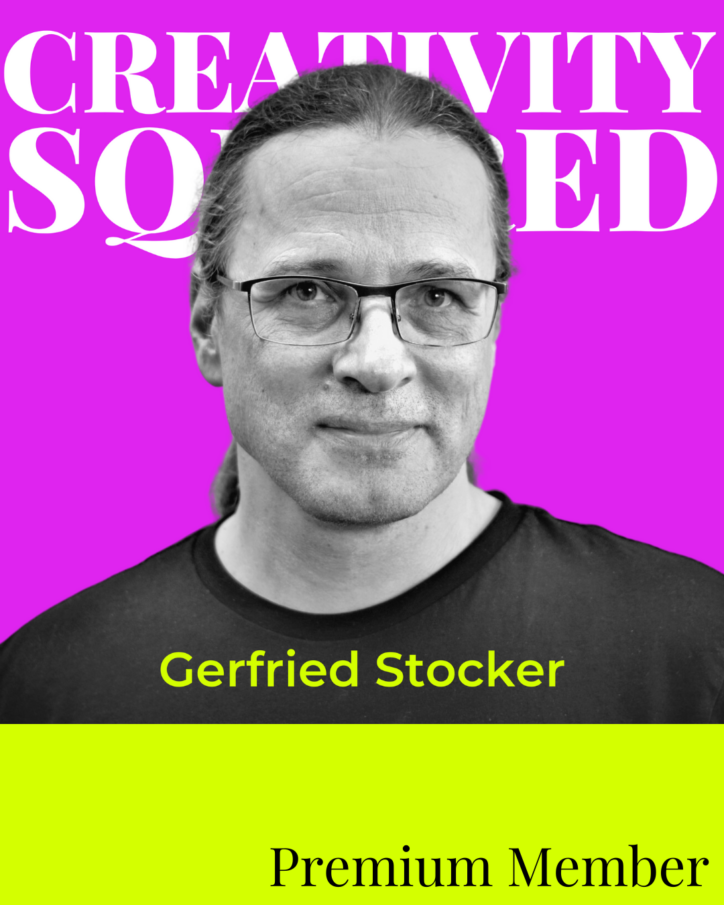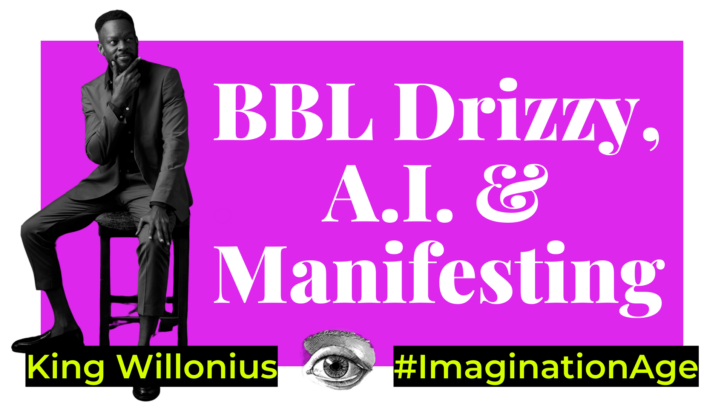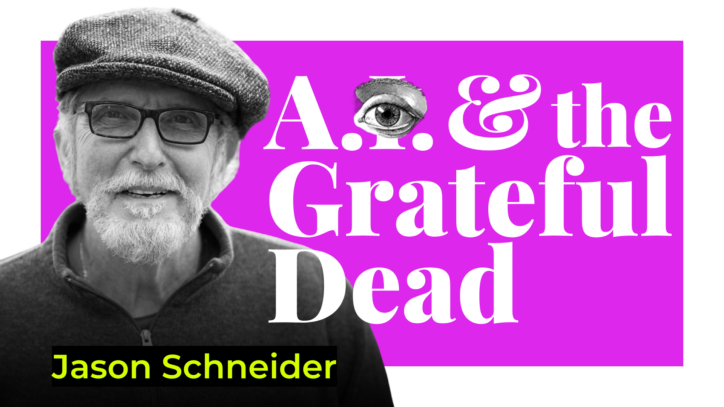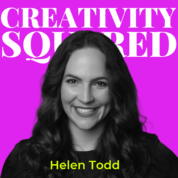
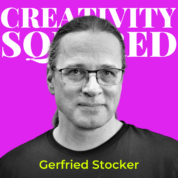
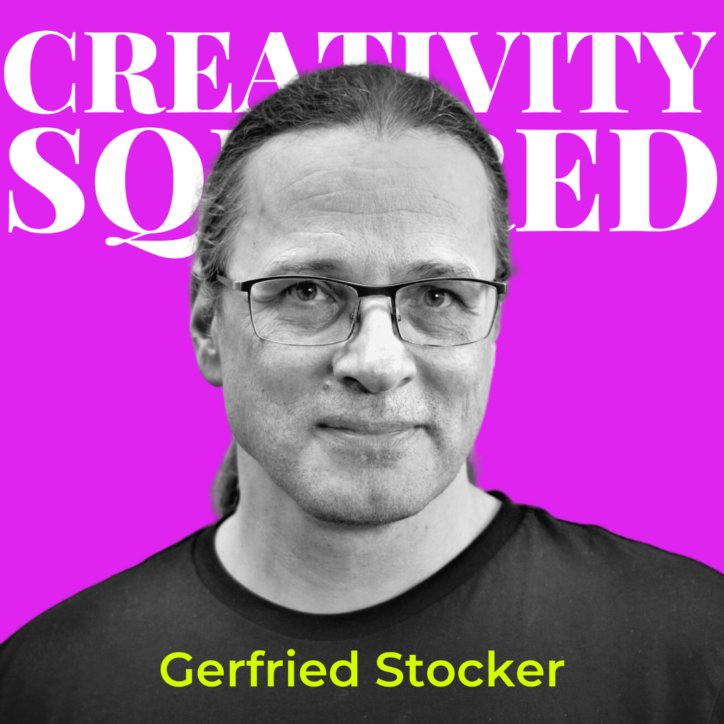
Ep11. Truth, A.I. & Reality: Investigate Truth & Ambiguity through Art with Gerfried Stocker, Artistic Director of Ars Electronica
In an era where technology infiltrates every aspect of our lives, the role of art becomes increasingly crucial in understanding and shaping the complex relationship between technology and society. At the forefront of this exploration stands Ars Electronica, an organization that transcends traditional boundaries to foster interdisciplinary collaboration and examine the profound impact of technology on our lives.
In our most recent episode of Creativity Squared, Gerfried Stocker discusses the impact of A.I. on our understanding of truth and objective reality. As the Artistic Director of world-renowned Ars Electronica in Austria for almost 30 years, Stocker also puts our A.I.-anxieties in some historical context and explains how he sees art as a medium for navigating shifts in power and authority.
Founded in 1979, Ars Electronica has been Europe’s largest festival for art, technology, and society. It’s more than a festival — the platform also includes the Ars Electronica Center, the Museum of the Future, the Prix Ars Electronica awards in digital art, the Futurelab incubator, and much more to explore the questions about our future. Ars Electronica never asks what technology can or will be able to do, but always what it should do for us, which I greatly appreciate their human-centered approach.
After stepping into his leadership role and as the guiding force behind Ars Electronica, Gerfried has led a talented team to revolutionize the Center and Futurelab. His influence spans from directing international exhibition programming, leading significant expansion and content revitalization of the Center, amplifying the Festival’s reach, to a thorough redesign of the Center’s interior and content. Gerfried is a consultant for numerous companies and institutions in the field of creativity and innovation management and is active as a guest lecturer at international conferences and universities.
The 2023 Ars Electronica Festival will take place September 6-10 in Linz, Austria. The week-long annual festival showcases hundreds of exhibits from artists pushing the boundaries of what technology can do for us.
The theme of this year’s festival is “Who Owns the Truth?” Artists were challenged to grapple with questions such as “Can truth be owned? Is there a right to truth and if it does belong to someone, what control and responsibility are associated with it?”
Gerfried’s experience and role at Ars Electronica gives him an unparalleled perspective at the intersection of cutting-edge art and science. Discover the unique perspectives and challenges that arise when art, technology, and society converge. To kick-off our discussion, Gerfried expands on the thinking that went into choosing this year’s theme.
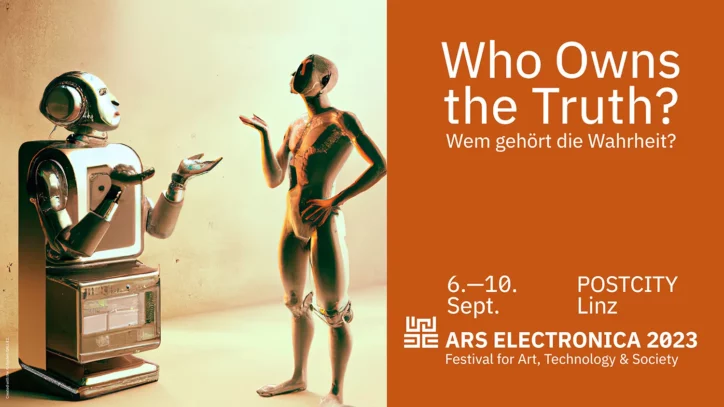
“The End of Truth?”
Gerfried says that the inspiration for the festival theme was in large part a reaction to ChatGPT bursting onto the scene. He described Large Language Models (the subset of A.I. tech that runs ChatGPT) as the newest and most powerful iteration in a long line of digital innovations (the internet, Google, etc.) that better aggregates information. But those innovations have brought challenges as well. Much like how the music industry has had to cope with digital transformation, Gerfried believes that A.I. will force us to once again reckon with our relationship to information and entertainment.
“The moment things get digital, they lose their status of being unique and original, because digital automatically means endless numbers of copies of the same thing. And now it’s happening on a next level with A.I. And it’s not only now the question of what is real in terms of physical existence, but the big question: what is true?”
Gerfried Stocker
We’ve already seen how humans can use deepfakes, voice cloning, and A.I.-generated images to deceive others. Fake pictures of the Pope in a Balenciaga-style puffer coat, impersonators on your feed talking to you with the voice and face of Tom Cruise, and so much more. Gerfried takes it a step further, considering a potential future where generative A.I. can fabricate anything out of whole cloth without human direction.
“Fake always needs some real element that you can fake. So it always has to be related to some reality. But A.I. is now enabling an endless number of manufactured realities. So in the blink of an eye, you can create hundreds of thousands of different realities that you don’t even have to make it up. So without even that fantasy of people to make up new fictions and realities, it’s just the machines. And this is probably something that really will have a huge impact on so many areas.”
Gerfried Stocker
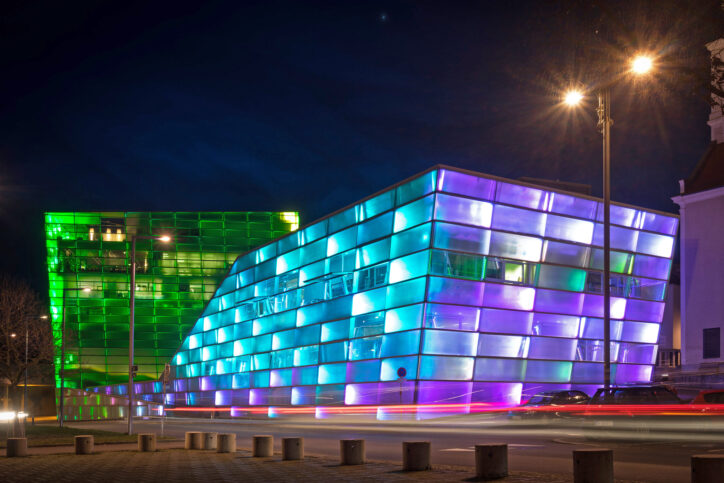
Already, he says, A.I.-generated art is making it more difficult to tell reality from fiction. At this point, a keen observer can still distinguish A.I.-generated art for what it is. Education is certainly helpful to understand context and how systems are structured to be able to read between the lines, but there are disparities in education. And even for the well-educated, what do you do if one day the whole network, your entire online experience, is entirely A.I.-generated? Where do you go for truth?
“We need new authorities, new institutions, or maybe people, where we can resort to and when we say okay, now I really need to know whether this is true or not. Who can I ask? And this is, of course, super dangerous. It’s a vacuum there because there is nobody. We have demolished many of our instruments of democracy, we have demolished a lot of the understanding of public values, public goods.”
Gerfried Stocker
Gerfried says he sees some hope in the European Union’s attempts to get ahead of A.I. regulation with attempts to regulate face-scanning and some of the A.I.-technologies with a high potential for abuse. But he says there’s still a long way to go, even in understanding what needs to be regulated before tackling how to regulate it.
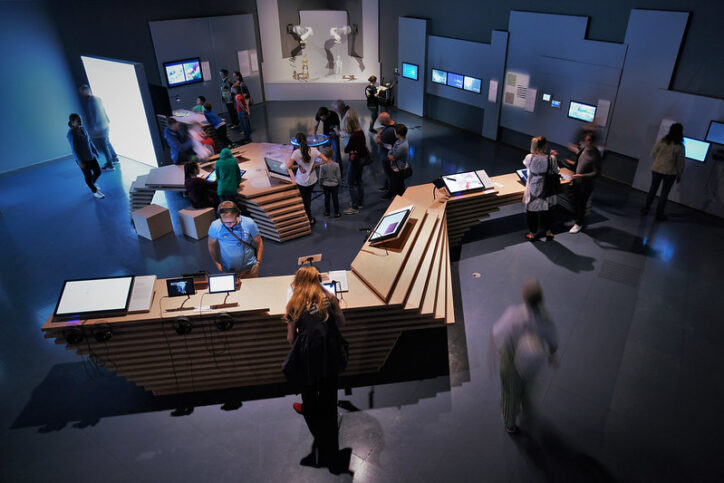
Art Making Space for Ambiguity
Art has long served as a catalyst for exploration, challenging our perceptions and pushing the boundaries of what is possible. Gerfried highlights the distinction between art and manipulative fiction, emphasizing that while fiction aims to provide answers, art seeks to inspire thought-provoking questions. By creating fictional worlds, artists encourage individuals to express their own inquiries and critically engage with the complex realities of our digital age.
Of course, the rapid adoption of A.I. is not happening in a vacuum. Conspiracy theories abound online to the point that one can easily find a version of the truth (or a lie that sounds enough like the truth) to confirm almost any bias that anyone might hold.
Gerfried compares our current struggle to grasp the truth to the time of the Enlightenment, when evidence-based scientific discoveries challenged the Catholic Church’s ownership of the truth for much of the world at the time. Now, he says, science seems to be losing its ownership of the truth as well, in exchange for a more individualist understanding of truth in the minds of many. For Gerfried, this shift in understanding could have big consequences for the ways that humans have organized ourselves.
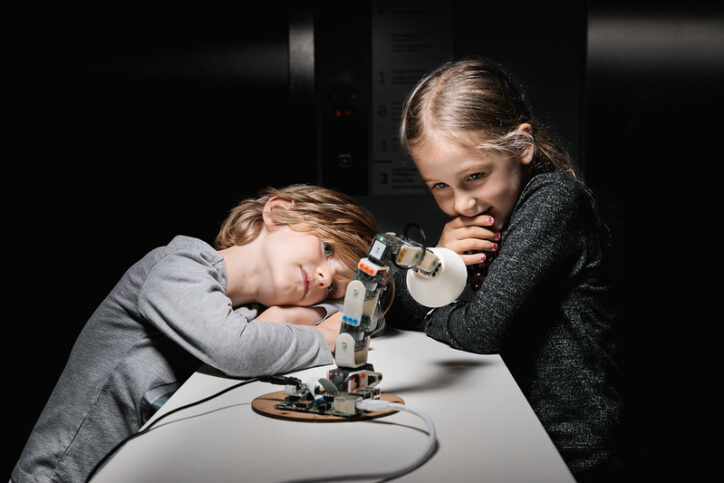
“There’s this understanding that there is a certain truth. And there is also somebody, some places, some institutions, that represent authority of interpretation of truth. This is a very important scaffolding of the social order of, what we need as humans, as humanity, as societies, to live together, to organize our daily lives, to organize our businesses, and all these kinds of things.”
Gerfried Stocker
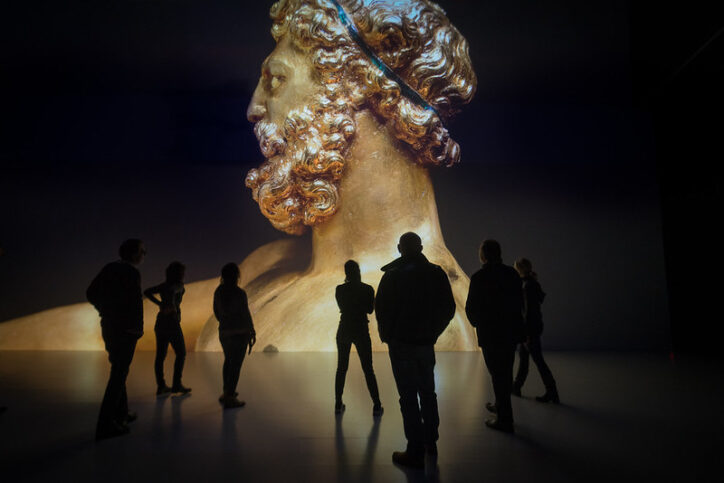
It’s a difficult thing, Gerfried says, to fully reckon with the break-down of our deference to science, because perhaps that deference has been misplaced to begin with.
“It is a misunderstanding, to see science as some authority that has the total absolute interpretation of truth. I think what we have to learn is there is no totality, there is no absolute truth; there is diversity, there is ambiguity. How to deal with this huge amount of ambiguity in our world is where, for me, the role of artists and art really come into the picture.”
Gerfried Stocker
Gerfried describes art as a forum for us to explore, struggle with, and maybe even resolve our anxieties around truth. Much like how music builds tension and resolves it through the use of dissonance and harmony, creating and interacting with art can help us resolve our more entrenched tensions.
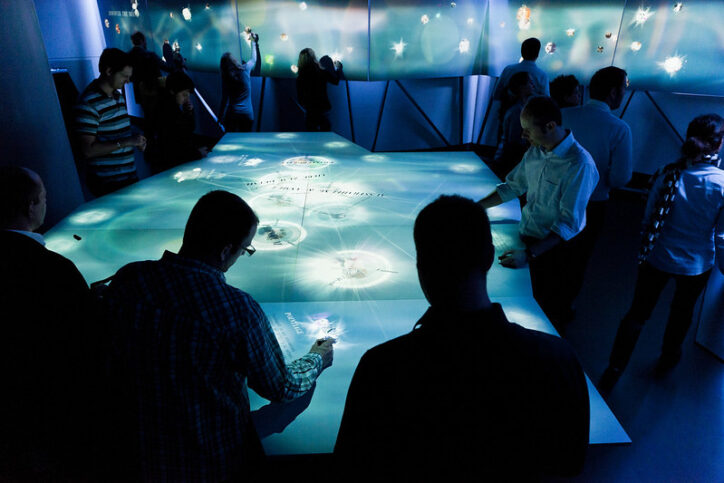
“The quality of art is not just in the beautiful result. It’s in the way we get to this moment of beauty. And the moment of beauty always goes through an experience of ambiguity. And I think this is a kind of practice that … allows us to gain experience with how to deal with ambiguity besides hitting each other.”
Gerfried Stocker
Ars Electronica and Art Festivals’ Role in Shaping the Future
Gerfried sees Ars Electronica as a venue for exploring that ambiguity, a place where we can maybe soothe our existential fears about new technology and instead ponder the possibilities of what it can do for us.
“There are these examples in history, where people say, ‘if you can produce so many books every week, people will be completely confused. It will be the end of our culture.’ So I think we should be aware that we tend to always see the doom days, we should probably focus more on our possibilities and our responsibilities to prevent the doom days. And this is what I think is probably the most important thing for us as individuals as well as society.”
Gerfried Stocker
As we move forward, it is crucial to recognize the transformative potential of art, nurture diverse perspectives, and continuously question and shape the relationship between art, technology, and society.
Links Mentioned in this Podcast
- Connect with Gerfried on LinkedIn
- About Ars Electronica
- Follow Ars Electronica on Instagram
- News and Ars Electronica’s Social Channels
- Ars Electronica 2023 Festival
- European Union AI Act
- Subscribe to the Ars Electronica Newsletter
Continue the Conversation
Thank you, Gerfried, for being our guest on Creativity Squared.
This show is produced and made possible by the team at PLAY Audio Agency: https://playaudioagency.com.
Creativity Squared is brought to you by Sociality Squared, a social media agency who understands the magic of bringing people together around what they value and love: https://socialitysquared.com.
Because it’s important to support artists, 10% of all revenue Creativity Squared generates will go to ArtsWave, a nationally recognized non-profit that supports over 150 arts organizations, projects, and independent artists.
Join Creativity Squared’s free weekly newsletter and become a premium supporter here.
TRANSCRIPT
Gerfried Stocker: I think what we have to learn is there is no totality, there is no absolute truth. There is diversity, there’s ambiguity, how to deal with this huge amount of ambiguity in our world, and this is I think where for me, the role of artists and art really come into the picture.
Helen Todd: Gerfried Stocker is a media artist and an engineer for communication technology and has been artistic director and co-CEO of Ars Electronica since 1995. Ars Electronica was established in 1979, and for over 40 years has been Europe’s largest festival for art, technology, and society.
It’s more than a festival. The platform also includes the Ars Electronica Center, the Museum of the Future, the pre-Ars Electronica Awards in Digital Art, the Futurelab incubator and much more to explore the questions about our future.
Ars Electronica never asks what technology can or will be able to do, but always what it should do for us, which I greatly appreciate their human-centered approach.
After stepping into his leadership role and as the guiding force behind Ars Electronica, Gerfried has led a talented team to revolutionize the Center and Futurelab. His influence spans from directing international exhibition programming, leading significant expansion and content revitalization of the center, amplifying the festival’s reach to a thorough redesign of the center’s interior and content.
Gerfried is also a consultant for numerous companies and institutions in the field of creativity and innovation management and is active as a guest lecturer at international conferences and universities. The 2023 Ars Electronica Festival will take place September 6th through 10th in Linz, Austria. And in today’s episode, you’ll get to hear a fascinating conversation about its theme, Who Owns the Truth?
Listen as Gerfried explores truth and reality, how we’re building multiple and manufactured realities, and the importance of art to explore ambiguity, to meet this moment in time. Enjoy.
Theme: But have you ever thought, what if this is all just a dream?
Helen Todd: Welcome to Creativity Squared. Discover how creatives are collaborating with artificial intelligence in your inbox, on YouTube, and on your preferred podcast platform. Hi, I’m Helen Todd, your host, and I’m so excited to have you join the weekly conversations I’m having with amazing pioneers in this space.
The intention of these conversations is to ignite our collective imagination at the intersection of AI and creativity to envision a world where artists thrive.
Gerfried, it is so wonderful to have you on Creativity Squared. Welcome.
Gerfried Stocker: Thank you very much. It’s a pleasure for me as well.
Helen Todd: Yes. It’s been a long time coming. I’ve heard about Ars Electronica for a long time through all my friends in Austria. And then also, Reeps One who was actually our first guest on Creativity Squared, I know he’s been part of the festival.
Gerfried Stocker: Mm-hmm.
Helen Todd: before too, and I’m so excited. I actually get to go this year.
Gerfried Stocker: Oh, great.
Helen Todd: which will be my first time going. So I’m really excited.
Gerfried Stocker: Yes, I can promise you it will be a very exciting experience just because of the really exciting, big and diverse community of people who are really deep into this questions and relations of technology, creativity, art, and science.
And, it’s really every year. I mean, that sounds strange when I promote this in this way, but, it’s also for us organizing this event. It’s every year. It’s really one of the most exciting things to be together with all these people.
This, you know, enormous amount of ideas and excitement and inspiration that is happening throughout the festival. So I’m sure you will like it.
Helen Todd: Oh, I can’t wait. And you all have been in the AI and technology space for a long time, even though I feel like a lot of the mainstream consciousness about AI impacting our lives really happened last fall with the onset of ChatGPT.
But let’s dive into this year’s festival theme, which I find really interesting, and it’s all about who owns the truth? So can you tell us a little bit about where that came from and why that’s so top of mind for you and the organizers of the festival this year?
Gerfried Stocker: I think it’s obvious that the main motivation to choose this theme was of course, this huge explosion of our attention towards artificial intelligence in particular, of course, that with ChatGPT, the focus went so much on, you know, whether this AI systems in particular, these large language models, whether they’re really like, you know, super magic truth machines, the next generation of super database and you get just all the knowledge that you want or whether they are something completely different.
And I think this is still one of the big problems that there is so much misconception about what’s the nature of this technology and therefore what we can expect from it. And I think this really brings, of course, the discussion that started already with the beginning of the digital revolution, let’s say 30, 40 years ago.
This is bringing this now really to a new level and a new dimension. And this is of course, this transformation that happens when things are getting digital.
So when you have information and you convert it into this new state of aggregation, and I think this is what digital actually is, it’s a new state of aggregation, of information and suddenly it really changes the rules, almost the laws under which information now suddenly can be worked with, can be accessed, has to be governed, and all this question.
And one of the main things always is of course, the moment things get digital, they lose their status of being unique and original because digital automatically means endless numbers of copies of the same thing.
And we have learned in the last decades, also in businesses, in the industry, think about music industry in particular, how painful it was for them, how difficult it was for them to get along with these changes. That music no longer needs a physical thing like the vinyl or the CD, but that can be just everywhere at the same time.
But after some time, I think, in particular the music industry has coped very well, and we see this transformations in so many areas and now it’s happening, of course, on the next level with AI. And it’s not only now the question of what is real in terms of physical existence, but now of course the big question, what is true?
So reality also in terms of truths, and I think it’s an interesting next level also of the discussion that we have since quite a while about fake, because fake always needs some real element that you can fake. So it always has to be related to some reality. But what AI now is enabling us is endless number of manufactured realities.
So with the blink of an eye, you can create thousands, hundred thousands of different realities that you don’t even have to make it up. So we don’t need even, you know, the fantasy of people to make up new fictions and realities. It’s just the machines. And this is probably something that really will have a huge impact on so many areas besides all the industrial and business areas.
But really how do we deal? With our concept of reality and truths, and we will have, for example, a big symposium with many experts, where we speak about, or that is called, you know, the end of truths. Are we now in this moment of time where we just, you know, we get rid of truths because it’s so much more exciting of whatsoever to just reinvent a reality every moment in time?
Helen Todd: That’s so fascinating and I could already imagine people listening could feel maybe a little uncomfortable because truth has been such a bedrock of how we understand reality and then to question it and have multiple realities, you know, what does that mean for our understanding of how we just interact in the world? I find that really fascinating.
Gerfried Stocker: And I think this, this is of course when we talk about the impacts of AI, I think this is really one of the most frightening because it’s so difficult, almost impossible to really envision what the outcome will be because of course, this understanding that there is a certain truth and there’s also somebody, some places, some institutions that represent authority of interpretation of truths.
This is of course, a very important scaffolding of social order, of the way, how, what we need as humans, as humanity, as societies, to live together, to organize our daily lives, to organize our businesses and all these kind of things. And it might be, you know, something that, that really could be maybe compared to the beginning of the Enlightenment when suddenly this unquestioned authority of religion, of the church who owned the truth because what the church said, what religion said, you know, this was the truth.
Nobody was, you know, even daring or thinking about the question. And then came more and more, all this, this new knowledge from natural sciences and Newton was understanding how gravity was working. Kepler was understanding how the planets were moving. Philosophers like Descartes, also started to build upon these facts of science.
They started to build a new perspective, a new image of our world, and also, of course, a new image of the position of humans in this world. And as much as we are, of course, I think still, oh, you know, I have to be really very grateful for this early scientists and the way how the scientific facts were able to replace the religious fiction.
On the other side, this very mechanistic worldview has also contributed a lot to the big mess that we find ourselves now with all, you know, this overarching industrialization and the idea that we can manage nature. That, you know, just with technology we can do everything. I mean, it’s a great idea. And I’m a trained engineer myself, so I know how exciting it is to be able to work with technology and to do what you imagine.
But of course it also led to a very strong misalignment between humans and the planet, human and the nature. And this is something that we see at the moment as well. And I think maybe what’s going on right now even it doesn’t seem to be so clear. It was, it’s, you know, in the hindsight it looks quite easy to understand.
Okay. There were first religion because we didn’t understand the world. Then scientists made us understand the world and we got the new, also a new authority of truth and interpretation, which was of course science and still is science.
But we see of course, also since quite a while now, in particular, I think on a global scale, due to the Covid pandemics that people more and more start to question science and that people, that it’s becomes almost fashionable to be skeptic about science.
And, I think this is really a very, very difficult thing because of course, it is a misunderstanding to see science in a way, or some authority that has the total absolute interpretation of truths. I think what we have to learn is there is no totality, there is no absolute truth, there is diversity, there is ambiguity, how to deal with this huge amount of ambiguity in our world, and this is I think where for me, the role of artists and art really come into the picture.
Because so far everything could be negotiated between, I don’t know, industry and politicians and things like this, but we see that we have to deal with phenomena that we are not used to deal with.
We see that things are getting much more complex, that things turn out to be of a nature where a clear yes or no, black or white answer will not be possible at all, or definitely not sufficient in terms of helping us further. And of course, this is not new in humanity, in human society and, you know, thousands of years that we, that we know about our history.
But every time when these things became very important and strong then we also see the upcoming of new philosophical, religious, spiritual dimensions. So I think lots of these conspiracy theories nowadays is also very much due to this lack of orientation that is going on.
And then of course, automatically you start, you know, to look what is more appropriate, what is more, what fits better to your actual, your own situation, the way how you feel.
And, well, if it’s nicely presented, why shouldn’t you believe in things? Even if you might rationally be able to understand, they are stupid, they cannot be true. But of course, the category of truth is changing as well. And so you see this will be a big thing this year at the festival to discuss this whole issue.
Helen Todd: Yeah, I find it fascinating. It, as you were speaking it, reminded me of a review of a TV show here in the States called Euphoria, which, super popular, I never got into it, but it’s kind of this high school landscape and it’s not realistic at all, but it resonated with a ton of viewers as being emotionally true. Like the emotion that was conveyed in it held the truth and it kind of reminded me a little bit of even Trump supporters that, you know, he probably does not honor what most people would consider truth, but the emotional resonance of like, what truth is, I think is interesting. So like, the emotional component to truth I think is an interesting thing to explore.
Gerfried Stocker: Yeah, I think this is super interesting in a certain way. I think it’s a way to approach the world that we just cannot, you know, get rid of. And there is a quality behind this. You know, this is, I think, very much, that this process of taking more and more care of the role of individuals, a process that is also in parallel going on, of course, with a, with an enormous growth of our awareness of the diversity on this planet.
It seems, you know, some of these things are like side effects of something that I think is extremely good and important. I mean, the necessity was already so strong that we actually really start to embrace the diversity and all these discussions of equality.
Of course on the other side, this can be wonderful, you know, argument just to say, okay, well, you know, whatever I think, whatever I like to be true is true and well, so far so good. But then again, I mean, besides all this, possible interpretations of our reality, there is still a lot of hard facts. There is science, and science is something that is based on evidence.
The science, true science, well done science is anyway not claiming to own the truth. But it’s extremely important and wonderful tool of humanity to investigate our life, to understand our life, to understand our world. And so when this, you know, conditionality or I don’t know what the right English term would be, but this kind of, everything is possible because I like it at the moment, it fits my lifestyle at the moment, when this takes over, we might very easily come, you know, to a society that is very easy to manipulate where, and this is I think what we see behind Trumpism, very strong, I mean, a society that is prepared for this, of course can be easily manipulated.
And that’s unfortunately not only a phenomena in the United States, we see this on a global scale in different flavors. So I think again, this is now for me another point where art, art festivals, cultural events really have a kind of responsibility to go into these topics because we won’t be able to solve this just with a clear yes or no decision.
So we need to learn to deal with ambiguity, to be open to any possibility, but still to be very clear on, you know, what’s right or wrong. And even you know, even talking about this makes me confused because it’s which is of course the nature of ambiguity. I mean, we are so trained to say, you know, at the end there will be always some right or wrong. There will be always some black and white. Probably art is one of the very few areas where there is space for ambiguity, where ambiguity even is maybe a source of the excitement of art.
I mean, we know this, for example, from music, the tensions that are built up by harmonies and dissonances, and then how you solve a dissonance into harmony. I mean, and how you solve, ambiguity of harmonies into expected harmony. I mean, these are the moments when we say, oh, is this beautiful.
So, it’s not just, you know, the quality of art is not just in the beautiful result. It’s in the way how we get to this moment of beauty. And the moment of beauty always goes through an experience of ambiguity.
And I think this is a kind of practice that allows artistic environments in terms of, you know, festivals, cultural institutions, people who are artists who work artistically, that allows this spaces of artists to be more understanding for ambiguity and maybe find strategies.
Or “strategy” already sounds like, you know, okay, this is exactly the way how to do it, but allows to gain experience with how to deal with ambiguity besides hitting each each other. Because the usual way how humans deal with ambiguity is we start to fight and we start to fight, we get angry and we hit each other and so on and so forth. So we need to find other ways to deal with it, and I think art can really help us there.
Helen Todd: Yeah, I couldn’t agree more. And I got to listen to Stephen Fry, and that’s actually where I met Harry or Reeps One was at this presentation from Stephen Fry where one of the things that he said is that we really need artists to translate this moment in time.
Cuz if not then you get more of the dystopian or the fear around it versus kind of what you were saying, playing with it and using the art as an exploratory thing of what does this technology mean to us right now. So I love how, you know, art can help guide us through this time period.
Gerfried Stocker: That’s really important because we have, of course, fiction as one of the, you know, basic elements of art. This is what art is about. But the interesting thing is, you know, in art we don’t use fiction in terms of creating a final result or something, final fiction.
Art is always used as a way of exploration. And I think that’s the very big difference between fiction in all this, you know, fake and fake realities where, in a manipulative way, in a populistic way, there is to create a fiction, to give people an answer. But art creates fiction to allow people to express the right questions. And I think this is the very important point.
Helen Todd: Yeah, I love that. And especially, you know, in navigating what is real and what is not real. Now that we have, you know, deep fakes have been around, but cloning voices and AI manipulating images is just going to I think be more widespread.
So understanding what you’re looking at and consuming, understanding if it’s real or not real, you know, it’s gonna get very interesting and even from, you know, a legal evidence standpoint of photographs and video being like, this is evidence of truth, you know?
Gerfried Stocker: Mm-hmm.
Helen Todd: That’s going to go out the window really quickly right now as well as we enter this phase.
Gerfried Stocker: Yeah. I mean, this is again the point where it gets a little bit frightening because, I mean, we believe, and I think we actually believe in a world in the time where many people in our societies due to a quite reasonable level of education
And of course it varies very much even, you know, within well and privileged countries like here, Austria, we have of course big discrepancies between the well educated and it’s very social difference of course, and the people who don’t have appropriate access to education. But nevertheless, I mean it’s in general on a very high level.
So we tend to believe, and I think we do, we live in a time and in the world where we can, as individuals, we can make proper decisions about what’s true or not true, untrue. This is how we have been raised.
And I think it worked for quite a long time that if you were serious enough and, you know, you got your education and you got your senses together, you could quite easily, you know, find out the difference between a lie and the , the facts and the fiction, the manipulation and the reality.
But of course, this is now getting away. It’s, you know, like the carpet that is pulled out under our feet. Not even a very well educated person is already now and will even, more so in the future when these tools become more and more perfect, be able to tell the difference between truth and reality.
And it will be not just, you know, not possible to look at the image and see whether it’s the real Pope or whether Donald Trump or a fake Pope or Donald Trump. It will be also when you try to investigate it. Because now at least, you know, I go into the internet and after a few minutes you can find hints or evidences.
But when this is, when our whole networks, when our all information spaces are really kind of soaked up with all this artificial different realities, I mean, where would you go?
It’s already now, I’m sure, as you know, as a journalist, you also, experienced this very often. You know, you don’t really know anymore. You know, where should I really go for if I want to check the truth?
So what is necessarily ends that we need new authorities. We need new institutions or maybe people where we can resort to. And when we say, okay, now I really need to know whether this is true or not, who can I ask? And this is of course, a super dangerous, it’s a vacuum.
No, there is, because there is nobody, we have demolished many of our instruments of democracy. We have demolished a lot of the understanding of, you know, kind of public values, public goods. Like, you know, there was particularly in Europe, I mean, it was for a long time it was like, you know, the BBC.
Go to the BBC and you can’t be sure you know this. Everything will be true there. I mean, it still is, but it’s eroding – the importance of this public media, this, as institutions to look for the truth. It’s eroding. So where will people go? And we see already, it’s so easy then to, oh, Donald Trump said it, or, you know, our Chancellor or our president.
I mean, it doesn’t matter where you’re in the world. The easy solution is always go to the loudest voice, and the strongest voice. But we know from history that this is the most dangerous way.
And I think it’s, you know, no longer enough until very recent time, we could say, okay, what’s necessary is, you know, learn maybe to understand how coding works, how software works, learn to understand, you know, how they speak media, social media platforms. What is their commercial reality?
You know, how they are governed, you know what, what are they really interested? Of course they’re interested in selling advertisement to make money. When you study these structures, you can already get a very good guideline to deal with truths and lies.
But this kind of, you know, cultural techniques will no longer be sufficient because the enormous amount, the tsunami of manipulated or, yeah, invented, effects this, manufactured realities will really be a problem. But then again, there are these examples in history. You know, when book printing came up, you can find the same statements where people say, no, I, if you can produce so many books every week, or it takes just one week to produce a book, imagine how many books will be there and people will be completely, completely confused and will be the end of our culture.
So I think that’s also something we always should be aware that we tend to always see the doomsday. We should probably more focus on our possibilities and our responsibilities to prevent the doomsdays.
And, this is what I think for the present time and for the coming years is probably the most important thing for us as individuals, as well as society.
Helen Todd: Yeah, I couldn’t agree more. And one thing that you said that was interesting is our, and also in the description of the theme is, the rights and obligations of digital citizens and how much, you know, the, our offline and online worlds are blurring.
And, you just mentioned that there’s, you know, the institutions are crumbling, but we don’t really have, in my mind, adequate institutions at a global scale? Cuz even if you look at social media right now, depending on which country you live in, you have different digital rights. You know, Europeans with GDPR have the most digital rights. So even though we’re accessing the same platforms, you know, we’re coming to it with different digital rights in that regard.
And I thought it was actually really interesting that Facebook and was actually forward thinking that Facebook established the oversight board cuz I thought that was actually, you know, a good approach except for that it’s a derivative of Facebook. And Facebook almost like a child telling a parent like, this is how you’re going to parent me. But in the realm of imaginative institutions, I thought it was an interesting step forward.
And OpenAI has a grant out now or the application just closed of like, you know, what’s novel and innovative ways to regulate AI, but I haven’t seen, you know, a global effort to like put together or coming together, how do we want to regulate the internet or what are the guidelines or institutions that we want? Have you seen anything, or what are, what are your thoughts on, you know, a global effort in this space.
Gerfried Stocker: Mmm-hmm
Helen Todd: from an institutional standpoint?
Gerfried Stocker: I mean there’s two problems. The second one of them is what you mentioned, the global dimension of it.
We are so unprepared to deal with topics on the global dimension because we are, and we, when I say we, I mean, you know, like Europe, United States, Japan, Korea, Davan maybe. So the rich, industrialized small parts of the world, you know, that we are so used that we own this authority of interpretation.
We, I mean, we don’t always act in the best way, but we would at least know how to do it in this is the kind of, you know, understanding we have for ourselves. So the moment we think about global, we immediately have hierarchies in our mind. We think about the powerful, the rich, the successful, and the poor, and whether, you know, we look down at it or whether we, in a kind of paternalizing way, think about them as, you know, oh God, this poor people who have nothing to live as always.
And it’s, it’s super difficult. I mean, I think everybody who is true to him or herself knows that even when you really try, we are so impregnated in our Western culture with this hierarchical perspective that finding global dialogue and really creating global institutions or authorities, that we really take serious, I mean, not this kind of globality where we say, okay, we have the money. So we establish now, I don’t know, an international courtyard according to our understanding of rules, how to govern climate change or artificial intelligence or something, but really global in a terms that would give everybody an equal chance to get it right and get its perspective.
The second thing is, very much I think the problem we have been discussing so much about how terrible it is to lose privacy with digital world, but what we really have overseen completely is that in this process we completely lose the public. There is this old traditional value of something that is public that belongs to everybody.
The representation of society and public by a government, by a parliament, I mean everything that is democracy. It became probably so normal and so every day that we just forgot for some time to really think about that democracy, true democracy, liberal democracy, open democracy is something that you really constantly have to work on.
And when it’s now, you know, to look at this question of what could be institutions or authorities, I mean, it’s really nice that, whether it’s Facebook,, Google, or now OpenAii, I mean, is establishing their ethical boards. But I mean, it’s, it’s not even a joke because it’s such a bad joke. You can only get angry about it.
I mean, oversight can only work if it’s extra institutional. So, so in the same way as the government needs oversight, which is the parliament, which is, the democracy, these people who are elected by the people and then they are the Parliament and they are there to be the oversight of the government.
The same thing is, of course, with companies. I mean, in particular when it’s this super big and powerful companies, I mean, no way that they could really be the authority of oversight. I mean, it’s good that they built up these teams as a kind of consultants to the management, as consultant to the developers and inventors and so forth.
But we need independent institutions, and I think this is something we also seem to have forgotten. I mean, very often when, when I talk about this, people tell me, yeah, but how would this be able, you know, with these super big companies and business would no longer be possible because all of this will.
I mean, think of one of the most important business areas which is food and agriculture. I mean, I’m sure it’s pretty the same in the United States than here in Europe. I mean, millions of offices every day swarm out to look at every food stand, at every burger shop, at every supermarket, at every restaurant to make sure that there are certain levels of hygienic measurements done to make sure that when you go there as a guest in the evening, in the restaurant or to a food stand in the lunch break or to the supermarket, that you can be basically very sure of that things won’t harm you.
Think about all the car industry. I mean, how many rules and regulations do you have undergo until you are able to a car that is manufactured in Asia or in the United States to send it to Europe or the other way around?
So we have examples of successful businesses. And we could probably add a lot more, where we have a very strong regulation and it’s not damaging economy, it’s actually supporting the economy because at the end it’s all about true trustworthiness. You need to be able to trust that when you enter a supermarket or a food stand or a restaurant and so on that their prime intent is not just, you know, to rip off your money and, and they don’t care whether you get sick or not.
So I think even if it will take some time, we will be able to do this. And European Union has been really at the forefront of this with the GDPR. I mean, we have now big difficulties with the European AI Act that is strongly influenced by the big companies. So we are not very happy with how it went so far, but it’s always a process.
Helen Todd: And for those who aren’t familiar with the European AI Act, can you kind of bring everyone up to speed where it was and why you’re not happy with it?
Gerfried Stocker: How many more hours do we have?
Helen Todd: Maybe more the elevator version.
Gerfried Stocker: Yeah, I mean, the elevator version is harmless. I, one can only say okay, the European Union understood that it’s important for two reasons to build up a kind of basic regulations. The one reason, of course is because Europe is really afraid of losing any chances to compete in the global market.
So it’s very much about the digital sovereignty of Europe and European states. And the second one, of course, is to protect people from it. And basically they were on a very good way to develop this until, beginning of the year when ChatGPT you know, this big boom, changed every discussion and every opinion about AI.
And so they in many ways, they had to start again. So there is still very interesting things there I think, that are really going in the right direction. Like really regulating the way how face recognition and this kind of biometric identification systems that they cannot just be applied to any public space; you need a good reason, you need a court to give you the permission to do it.
So you cannot just put on cameras and have mass surveillance like it’s happening in China, in many cities. But in terms of really understanding what has to be regulated, I think we still have this big problem. We don’t really see that what we need to regulate is the companies, the people who develop it and who decide about the applications.
So it’s so much easier to say, well, let’s think about some rules, how to regulate the technology. But, and I think this is quite a big problem and, and it would really take much more time to elaborate about it. And I’m not totally negative about it. I mean, it’s an important first step.
We just cannot now say, okay, fine, it’s done. But I think this is clear also to the policy makers in Brussels, and I think it was very important at the end that they made a first draft and the first also set of regulations, so not just the draft anymore as a starting point.
And it will be of course, endeavor and a challenge for the coming years. No doubt about this.
Helen Todd: Yeah, well I’m very pro-regulation in general, so, I’m very curious, how it will play out. Well, and one thing that I really love about Ars Electronica is that it’s art, technology and society, and that you really, you know, focus on the society portion too.
Can you share with our listeners and kind of expand how you think, how you think about that and looking to the future, how they should all support each other?
Gerfried Stocker: Mm-hmm. Well, we have this super lucky, privileged situation that already in 1979, 44 years ago, two years before IBM brought the personal computer to the market, three years before Sony brought the first CD player to the market.
So really Stone Age of digital world, there were these clever people, a scientist, a artist, and a journalist who came together to develop a new art program for the city of Linz. And because they were a scientist, a journalist and artist, of course, they couldn’t really decide so easily, should it be a scientific conference, an arts event or just, you know, a big social entertainment.
And probably after many weeks of discussing, they said, well, okay, you know, just. Damn it. Let’s call it Festival for Art, Technology, and Society. I mean, this is a little bit, the funny interpretation of mine of this original, but the very important point is that they really took this serious.
They understood that transformation is something that cannot be just guided and driven by one sector. If you need to change things, you need to bring in everybody. And I think this was their main idea to really create this triangle of art, technology, and society.
And the great thing here is of course, that the concept behind this is utilize, use, you know, this wonderful qualities of art and artists, their curiosity, their eagerness to look behind the curtain, the merciless in how they deconstruct things, and of course the excitement, how they create something new out of it.
I mean, this is such a wonderful set of qualities that the art brings to use this to try not only to understand how new technologies are shaping society and vice versa, but to empower people and enable people to become a part of it, to integrate in it.
So it was not just the idea to be educational, but to enable people to become creative participants themselves. And the second great thing is, of course, it put Ars Electronica in a position between the chairs. Because if you’re art, technology and society, of course, each of these three sectors say, ah, you know, you don’t belong to us.
You know, you have too much technology. This is what the artists said. And the scientists said, I mean, you are not only, you know, professors of universities, so how can you dare to speak about this? And the good thing is when you are set up between the chairs, you recognize at a certain point, wow, this is your own territory and you can build up, so to say your own perspectives.
And in all these decades now with thousands of artists from all over the world, we have really been able to grow a kind of platform where exactly this way of looking at the world, thinking about the world is not just a nice add-on, but it’s the core of Ars Electronica. So it’s not the art festival that is also looking a little bit into science or scientific conference that is doing some playful things with the artists.
This interdisciplinarity, this crossover, however you call it, this is the core of Ars Electronica, and I think this is what makes it so exciting.
Helen Todd: I love that it started with a journalist, a scientist, and an artist that came together for the festival. That’s really great and I feel that we could speak for hours on this subject, we barely just scratched the surface with everything that you have going on with the festival and university and prizes.
So, before we sign off, what are some things that you wanna make sure that our listeners and community know, either about Ars Electronica, or just about AI and art in this moment?
And that’s kind a big question for sign off. I’ll throw it out there.
Gerfried Stocker: Well, as I think it’s happening quite often with this, you know, super interesting topics of how technology is related with social developments and innovations. Of course, we have wandered out in many areas. The core, of course, for me and then Ars Electronica, is that it’s really extremely valuable to have this artistic perspective on it.
I mean, this is, it’s not just another conference or another event where people talk about AI. It’s an event where you really bring in also the very different perspectives. And one thing, for example, to mention is we have a super interesting program since it’s the sweat time already this year. It’s called Festival University, and it’s like a summer school for international university at the festival.
It’s something that we are creating together with a totally new university that is being founded here in Linz. Last year we had 200 students from more than 80 countries coming together here for four weeks. And they come from very diverse backgrounds, from art and design, from engineering, from social sciences, whatsoever.
And just to have this experience of people from such different backgrounds coming together, working on the topics of the festival. This is really a very unique thing. It is one of the experiences where it really still makes super sense to travel. I mean something that we are of course discussing very often nowadays, you know, all the people traveling to our place to see the festival.
But then again, if we don’t create these moments where like-minded people can meet each other and have their experiences and their learnings, then I think we do even more damage then, and we cannot do all of this just online. I think that that’s, I’m at least based on my age, I’m totally convinced that we need physical, social exchange as well. And I think this is a very important part.
Another interesting thing to mention, of course, is that the festival also has become the frame for many really wonderful international award activities. So we have an award competition since 1987. For digital arts, for artists who work with computers, with new technologies, from computer animation to art projects that work with biotechnology and genetic engineering.
Since this prize started, we had I think about 80,000 submissions. Only this year, we had 4,200 submissions. There is a huge crowd of international experts who serve as jury members to select the price winning project. So, you can be pretty sure that some of the best projects that are actually happening right now out there will be at the festival because not we are so great in doing the festival, but we have this wonderful network of experts who decide this parts of the programs.
Another important part for us is really building bridges. The festival has also really become a kind of family event for the local citizens here, for the region in particular, like Saturday, Sunday, it’s we do, for example, a farmer’s market embedded into the digital art festival. We have a concert night where the Symphony Orchestra is playing together with digital avant-garde musicians.
So it’s really about looking into the diversity and making the or giving the diversity a platform where it really can happen. And so the only thing I can wish for that we will have another 44 successful years. And if you can’t come this year, I can promise there will be another opportunity next year, but I would recommend to come this year.
Helen Todd: Yeah, I love it and I’m so looking forward to being there in person, and especially hearing more. I’m really curious how the artists are gonna explore this theme about truth and multiple truths and the plurality and kind of the nuance and ambiguity in it.
Well, last question is, you know, since you are so well versed and have been in the space so long of AI and creativity, do you have any predictions of what, and the tech is moving so fast or wishes as we are in for this moment in time?
Gerfried Stocker: Well, I think in particular it’s super important that the artists, the people who are, and it’s difficult to describe it like this, but to be on a point, who are the real creators. I mean, we have so many content production nowadays and many areas of content production that’s obvious can be replaced by AI.
But then I think there is a certain level where it’s not just enough to press a few buttons to create something that looks nice or sounds nice. Art always is a process of investigation, of research, of diving deep and going beyond the obvious.
And if these people are embracing AI, I’m totally sure that super new things will come out and that at the end, I think that’s maybe one of the few possibilities we have to mitigate the dangers as well.
I mean, one thing, of course is important to raise the awareness about the difficulties, about the dangers. The other thing is to work hard on examples on possibilities that show that not only show the benefits because it sounds immediately like advertisement for it, but that utilize the benefits, utilize it for your own possibilities.
And I think this form of critical awareness and creativity coming together as one of the really characteristics of what artists actually are and what artists are doing. This is the really interesting thing. I mean, any other prediction in this area, of course is, super speculation. I’m just pretty sure that artists will find interesting ways working with it.
Much more interesting ways than we have right now. I think that’s also important. At the moment we are, most of the projects are in a very early stage. It’s very early experimentation, which is necessary, and I’m super happy and proud of all the artists who go in this area. And there, there are great exciting, things already there, but this is the beginning.
Helen Todd: I have one, one more follow up question because, I’d like to ask this question of have we seen the Citizen Kane of digital art in the same way that Citizen Kane made us really rethink the entire form of cinema? Have we seen an art, that’s really made us rethink the medium of digital in a way that’s transformative?
Gerfried Stocker: I mean, I would say immediately, yes, but I know, then you ask me, who is there?
You should never do this as a festival organizer. [unintelligible] So there are diplomatic answers, of course, yes, there are many of them. And also Citizen Kane is one of, you know, this movies that, really so obviously showed us, I mean also to understand what Citizen Kane showed us we needed, you know, many of these other experiments and Citizen Kane was of course maybe the one of the best well-knowns.
But the moment you start to think you know what other artists, I mean, just think of, you know, like the French Lu whale and, and people who really reinvented not only cinema, but they created a completely new art form of expression out of it. Of course, commercially less successful. But I think it’s the multitude of approaches, that we have.
And if we have the Citizen Kane, I would be anywhere immediately skeptical because I think, you know, this is too mainstream. This cannot be real.
Helen Todd: That’s the best answer. I love it. I love it. Well, I feel like we could, we could talk for hours, but, it is such a pleasure. Thank you so much. It’s really great to have you on the show, Creativity Squared and I look forward to meeting you in person in the fall hopefully. Yes.
Gerfried Stocker: Yes, thank you very much. It was really enjoyable to talk about our activities and looking forward to see you in September.
Helen Todd: Thank you for spending some time with us today. We’re just getting started and would love your support. Subscribe to Creativity Squared on your preferred podcast platform and leave a review. It really helps and I’d love to hear your feedback. What topics are you thinking about and want to dive into more?
I invite you to visit creativitysquared.com to let me know. And while you’re there, be sure to sign up for our free weekly newsletter so you can easily stay on top of all the latest news at the intersection of AI and creativity.
Because it’s so important to support artists, 10% of all revenue, Creativity Squared generates will go to Arts Wave, a nationally recognized nonprofit that supports over a hundred arts organizations. Become a premium newsletter subscriber, or leave a tip on the website to support this project and Arts Wave and premium newsletter subscribers will receive NFTs of episode cover art, and more extras to say thank you for helping bring my dream to life.
And a big, big thank you to everyone who’s offered their time, energy, and encouragement and support so far. I really appreciate it from the bottom of my heart.
This show is produced and made possible by the team at Play Audio Agency. Until next week, keep creating
Theme: Just a dream, dream, AI, AI, AI

